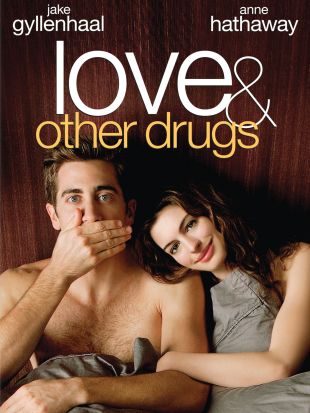For a movie all about pharmaceuticals that alter the body's chemistry, Ed Zwick's romantic comedy Love and Other Drugs succeeds thanks to good old-fashioned onscreen chemistry between Jake Gyllenhaal and Anne Hathaway.
As preternaturally charming and ever-horny salesman Jamie Randall, Gyllenhaal manages to be as charming and roguish as George Clooney at his best. The movie's opening-credit sequence swiftly establishes his character -- while flirting with every woman who walks into his stereo store, and selling lots of product in the process, Jamie seduces a co-worker who jumps his bones in the back of the store. When they are discovered in the act by her boyfriend -- who happens to be their boss -- Jamie must look for new work. He eventually trains to become a rep for the drug company Pfizer, where he's teamed with road-weary, middle-aged Bruce Winston (Oliver Platt). Jamie starts charming nurses and doctors, making sure free samples of his products are on their shelves. During his schmoozing he meets Maggie Murdock (Hathaway), a beautiful Parkinson's patient who is the first woman in years who can't be won over -- at least initially -- by his seemingly effortless charisma. Of course, the two eventually start sleeping together, precisely because neither is looking for anything deep or permanent. But as they open up to each other, true love inevitably starts to look like a genuine possibility.
What's most striking about Love and Other Drugs, aside from the acting, is the amount of screen time the lead actors are naked. It's easy to be cynical about this, but the filmmakers aren't just using their actors' bodies to sell tickets. Maggie's medical condition leaves her afraid to let anyone get close to her, but she's too full of life to remain just a wallflower, and Jamie has learned to skate by on his ability to enthrall women to such a degree that he can stay emotionally removed from them. As they slowly open up to each other, their ease with each other's bodies acts as a constant metaphor for their inner lives.
Rest assured that their toned, glamorous bodies aren't the only reason these two actors were cast in the film. Anne Hathaway matches Gyllenhaal's erotic drive and also reveals Maggie's profound vulnerability in quiet moments like when her condition leaves her unable to use a pair of scissors. When Maggie discovers a Parkinson's support group and realizes that her life can be defined by something other than her illness, Hathaway makes sure we see the sparkle in her eyes without ever making the character cloying. And as for Jake Gyllenhaal, his work as Jamie Randall proves he's a movie star capable of carrying a whole film with his broad appeal while still nailing difficult emotional moments like Jamie's uncontrollable shaking when he tells Maggie he loves her for the first time.
If only the script's third act were as grounded in reality as the two leads, Love and Other Drugs would have a shot at being a classic rom-com. Sadly, instead of keeping the ending small and intimate, Zwick and company aim for a Jerry Maguire-esque "You complete me" moment that rings false even with the two performers doing everything they can to make it work. The end isn't the screenplay's only fault; a subplot about Jamie's annoying millionaire brother -- played gratingly by Josh Gad -- seems to have been tacked on in hopes of tricking people into thinking Seth Rogen or Jonah Hill is in the movie. Gad is an unwelcome and unnecessary distraction.
However, until that last act, the movie never derails since it spends so much time with Maggie and Jamie. The characters and the actors are so good together that you're more than happy to listen to their pillow talk.
